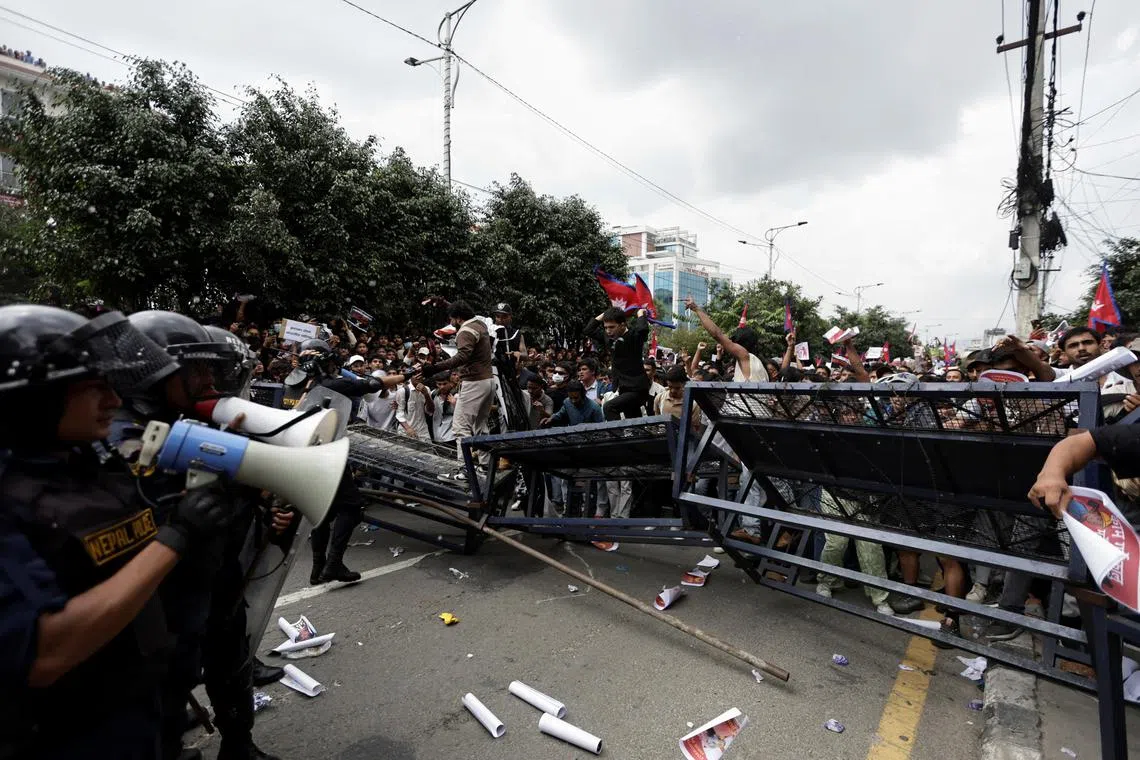Anti-corruption protesters in Nepal defy curfew, government lifts social media ban
Sign up now: Get ST's newsletters delivered to your inbox

Nepal on Sept 9 lifted a social media ban following protests that resulted in the deaths of 19 people.
PHOTO: REUTERS
Follow topic:
KATHMANDU – Anti-corruption demonstrators in Nepal defied an indefinite curfew on Sept 9, holding demonstrations and shouting slogans against Prime Minister K.P. Sharma Oli, a day after 19 people died in violent protests triggered by a social media ban.
Mr Oli’s government lifted the social media ban after protests turned violent
The unrest is the worst in decades in the poor Himalayan country that is wedged between India and China, and has struggled with political instability and economic uncertainty since protests led to the abolition of its monarchy in 2008.
On Sept 9, Mr Oli called a meeting of all political parties, saying violence is not in the interest of the nation and “we have to resort to peaceful dialogue to find solutions to any problem”.
But anger against the government showed no signs of abating on Sept 9, as protesters gathered in front of Parliament and other places in the capital Kathmandu, in defiance of an indefinite curfew imposed by the authorities.
Protesters have also called for people to participate in condolence meetings in memory of those killed in the Sept 8 protests.
The protesters set fire to tyres on some roads, threw stones at police personnel in riot gear and chased them through narrow streets, while some looked on and shot videos of the clashes on their mobile phones as thick black smoke rose to the sky.
Witnesses also said that protesters were setting fire to the homes of some politicians in Kathmandu, and the local media reported that some ministers were plucked to safety by military helicopters.
Reuters could not immediately verify the information.
“We are still standing here for our future... We want this country corruption-free so that everyone can easily access education, hospitals, medical (facilities)... and for a bright future,” protester Robin Sreshtha told Reuters TV.
India, others urge restraint
Organisers of the protests, which spread to other cities in the Himalayan country, have called them “demonstrations by Gen Z”, driven by young people’s widespread frustration with the government’s perceived lack of action in tackling corruption and boosting economic opportunities.
“The protest was intended, first and foremost, against the rampant corruption in government,” one protester said in an e-mail to Reuters in which they signed off as ‘A concerned Nepali citizen’.
Young Nepalis had been putting out social media posts about the “luxurious lives of the families and children of corrupt politicians and civil servants” and the government responded by clamping down on social media platforms, the e-mail said.
Mr Oli said he was saddened by the incidents of violence due to the “infiltration from different selfish centres” but has not directly responded to the protesters’ complaints about corruption.
Mr Oli, 73, was sworn in to his fourth term in July 2024 as the country’s 14th prime minister since the monarchy was abolished in 2008.
Two of his Cabinet colleagues resigned late on Sept 8, saying they did not want to continue on moral grounds.
Giant neighbour India, which is home to hundreds of thousands of Nepali migrant workers, said it was “closely monitoring” developments in Nepal.
“As a close friend and neighbour, we hope that all concerned will exercise restraint and address any issues through peaceful means and dialogue,” a statement from India’s Foreign Ministry said.
A joint statement by the embassies of Australia, Finland, France, Japan, South Korea, Britain, Norway, Germany and the US in Nepal said the countries were saddened by the violence and urged all parties to exercise maximum restraint, avoid further escalation and ensure fundamental rights are protected.
Last week, Mr Oli’s government imposed a social media ban blocking access to several social media platforms, including Facebook, after it said those platforms had failed to register themselves with the government.
Critics said it was an attempt to throttle free speech, a charge the government denies, citing misuse of social media to spread disinformation and commit fraud, among other concerns. REUTERS

